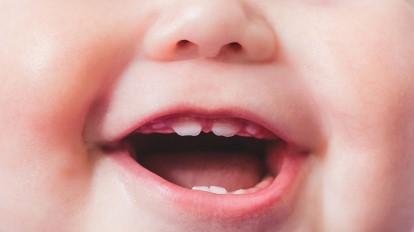Few things are as adorable as a baby’s totally toothless smile. But baby teeth development doesn’t take long. Before you know it, you’ll be navigating your way through the world of teething, brushing baby teeth, losing baby teeth and eventually welcoming in a mouth full of permanent pearly whites.
Baby teeth development actually begins before baby is born. Primary teeth are almost completely formed at birth but remain buried under the gums. These mini chompers start showing up when a baby is about six months to a year old.
Unfortunately, baby tooth development and eruption is a painful process. Teething can make an infant’s gums sore, causing your little one to be uncomfortable and irritable. Experts suggest that during baby tooth development, you massage your baby’s gums with a clean finger or give a chilled teething ring, a cool spoon or a cold, wet washcloth to help ease the discomfort.
Parents should begin brushing baby teeth as soon as the first tooth arrives. Why bother? These little munchers help baby with proper chewing and speech and hold space in the gums for permanent teeth. By brushing baby teeth early on, you’re creating good oral hygiene practices that will come in handy when your little one’s permanent teeth make their appearance.
Losing Baby Teeth
Most children start losing baby teeth by age six, starting with the front teeth and going all the way to the molars at the back by age 12 or 14.
Losing baby teeth is a right of passage for most kids. Some can actually pull out their own loose teeth, wiggling them out or using other techniques that may not be dentist-recommended. If your child is getting impatient with a loose tooth, use a piece of tissue or gauze to grasp the tooth firmly and remove it with a quick twist. If all else fails, take your child to the dentist for help removing the tooth.
Baby Teeth Care Basics
It’s never too early to start taking good care of your baby’s teeth. Here are some baby teeth care basics:
- Prevent early childhood caries, also known as baby bottle tooth decay, by making sure baby doesn’t sleep with a bottle containing any sugary liquids — even breast milk. And never give your child a pacifier that’s been dipped into anything sweet.
- Start brushing baby teeth as soon as the first tooth appears. Routine baby dental care should also include massaging the gums with a clean gauze pad. When all teeth have erupted, floss at least once a day to help prevent the buildup of dental plaque.
- Wean your baby off thumb-sucking if he or she is still doing so by age four. Otherwise, it can cause overcrowded or crooked teeth.
- Consider a combination of fluoride treatment and dental sealants, thin plastic coatings applied on baby molars to keep dental plaque from accumulating. Talk to your dentist before giving your child any fluoride dental treatment and have your child use only un-fluoridated toothpaste until two years of age.
- Take your child to the dentist after the first tooth arrives or by age one. Regular dental visits combined with daily baby teeth care can help give your baby a good head start on the road to dental health.
A great dentist or pediatric dentist can answer any questions you might have about baby teeth development and help provide tips for proper baby teeth care.

